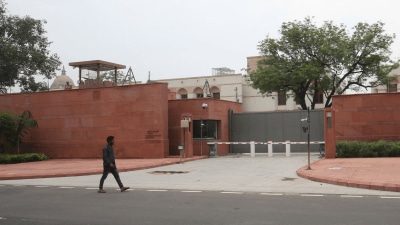4 months on, Punjab Cabinet to meet today, hiking acid attack victims’ pension on agenda
The Cabinet will be meeting after over four months, consequently about 150 agendas are waiting for its consideration.
 Punjab Chief Minister Bhagwant Mann (Source: PTI)
Punjab Chief Minister Bhagwant Mann (Source: PTI)Seven years after former chief minister Capt Amarinder Singh-led Congress government introduced a monthly pension of Rs 8,000 for acid attack victims, the Aam Aadmi Party (AAP) government has proposed to enhance the pension to Rs 10,000 per month.
The proposal will be tabled at the Cabinet meeting, presided over by Chief Minister Bhagwant Singh Mann, on Thursday. The Cabinet will be meeting after over four months, consequently about 150 agendas are waiting for its consideration. “The plan to hike the monthly pension was taken considering the inflation shooting through the roof. The pension hike will cost the state exchequer Rs 24,000 a year,” said an official privy to the development.
Razia Sultana was the Social Security, Women and Child Welfare minister when the Congress government had in 2018 decided that the acid attack victims, who could not find jobs, should be given a pension every month considering their health conditions after the acid attack.
“We are now taking it forward. We will give them more,” the official said.
To avail of the pension, an acid attack victim should be a resident of Punjab, and needs to apply for it. In case she has been rendered handicapped due to the acid attack, her guardian or relatives can apply before the Social Security Officer concerned, attaching a medical certificate mentioning “the victim has been rendered handicapped due to acid attack”. The applicant also needs to attach a copy of the FIR or complaint lodged in connection with the acid attack.
Besides, applicants need to attach attested copies of either voter list/voter card/Aadhaar card/ passport or driving licence and the residence certificate, along with details of their bank accounts.
Another significant proposal the Cabinet is expected to take up is directing colonisers to spend 50 per cent of External Development Charges (EDCs) imposed on them on development work by the government.
“Earlier, we asked the colonisers to spend EDC on green belts around their residential projects. Now, we will ask them to spend 50 per cent in the vicinity of residential projects, and the rest 50 per cent on several other projects. For instance, we will ask them to spend on repairing roads and carrying out other work. This will help get work done despite a fund crunch,” said the official.
The cash-crunched Punjab government has decided to impose a 2.5 per cent stamp duty on the transfer of property among blood relatives.
The Department of Revenue and Rehabilitation will table the agenda before the Cabinet. If the Cabinet approves, it will be notified.
While the direct transfer from parents to children (sons and daughters) and grandparents to grandchildren will require a stamp duty of one per cent, all other transfers, including between brothers, sisters, and husband and wife, would require a stamp duty of 2.5 per cent.
Official sources said the levying of stamp duty would help the government make a few crores. “The transfer of property among blood relations has many takers as it did not have any duty. We observed that parents transferred property to their children’s names and the same property was transferred back. This transfer was shown as a sale deed to mortgage it in a bank for a loan. At least 25 per cent of sale deeds were found to be among blood relatives. The revenue staff was busy dealing with these transfers. With the government now levying stamp duty, only serious transfers will be made,” said another government official.
The imposition of stamp duty drew flak from farmers’ organisations, with Balbir Singh Rajewal of the Samyukta Kisan Morcha announcing Wednesday to oppose it tooth and nail and threatening with a protest.







